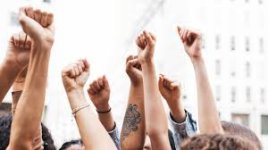Let’s be honest: politics doesn’t feel like politics anymore. It feels like war.
Every day, it seems like people are less interested in debating ideas and more focused on picking sides. This modern political war isn't really about taxes or healthcare or national strategy—it’s about identity, tribal loyalty, and division. The question is no longer "Who has the better plan?" but "Which side are you on?"
The left says it's fighting for justice, equality, and progress. And often, it is. But critics say it sometimes turns into a purity test—canceling, shaming, and silencing those who step out of line, even slightly.
The right says it stands for freedom, tradition, and national pride. But others warn it often slips into nationalism, conspiracy theories, and a rejection of facts that don’t support the narrative.
The sad truth? Both sides spend more time trying to "own" the other than solving real problems.
So we’re shown only the most extreme voices—those who yell the loudest or make us the angriest. We stop seeing the other side as people with different experiences, and start seeing them as threats.
Over time, we build echo chambers. We stop listening. We stop learning. And we lose the ability to change our minds—or even admit we might be wrong.

Both sides feel like they’re losing. That’s the irony. On the left, there’s frustration with leaders who make big promises but rarely follow through. On the right, there’s rage against institutions, global elites, and “mainstream narratives.”
In both cases, there’s a growing belief that regular people aren’t being heard—that politics is just a game for the powerful. And when people feel powerless, they turn to anger, conspiracy, or apathy.
But when politics becomes all or nothing, democracy suffers. Every election feels like life or death. Every opponent feels like an enemy. We stop making room for compromise—and without compromise, democracy doesn’t work.
What if we stopped calling people stupid or evil just because they disagree with us? What if we asked why someone feels the way they do, instead of just assuming we already know?
That doesn’t mean tolerating hate or ignoring injustice. It means recognizing that we don’t fix anything by screaming across the void.
We need political opposition. That’s healthy. What we don’t need is treating every disagreement like a war.
So let’s ask ourselves: are we really participating in democracy? Or are we just acting out a political play where the ending never changes, and nobody wins?
It’s time to choose differently.
Every day, it seems like people are less interested in debating ideas and more focused on picking sides. This modern political war isn't really about taxes or healthcare or national strategy—it’s about identity, tribal loyalty, and division. The question is no longer "Who has the better plan?" but "Which side are you on?"
A World Divided by Teams, Not Ideas
From the U.S. to the U.K., Brazil to India, democracies feel more divided than ever. People don’t just disagree anymore—they treat those who see things differently like enemies. You’re not just a voter. You’re part of a tribe. And the battlefield is everywhere: Twitter threads, YouTube videos, protest lines, and TV talk shows.The left says it's fighting for justice, equality, and progress. And often, it is. But critics say it sometimes turns into a purity test—canceling, shaming, and silencing those who step out of line, even slightly.
The right says it stands for freedom, tradition, and national pride. But others warn it often slips into nationalism, conspiracy theories, and a rejection of facts that don’t support the narrative.
The sad truth? Both sides spend more time trying to "own" the other than solving real problems.
When Outrage Pays the Bills
The media isn’t helping. Neither is social media. Platforms like Facebook, X (formerly Twitter), and YouTube run on algorithms that reward anger, not understanding. The more upset people are, the more they click, comment, and share.So we’re shown only the most extreme voices—those who yell the loudest or make us the angriest. We stop seeing the other side as people with different experiences, and start seeing them as threats.
Over time, we build echo chambers. We stop listening. We stop learning. And we lose the ability to change our minds—or even admit we might be wrong.
Who Really Has Power?
Both sides feel like they’re losing. That’s the irony. On the left, there’s frustration with leaders who make big promises but rarely follow through. On the right, there’s rage against institutions, global elites, and “mainstream narratives.”
In both cases, there’s a growing belief that regular people aren’t being heard—that politics is just a game for the powerful. And when people feel powerless, they turn to anger, conspiracy, or apathy.
But when politics becomes all or nothing, democracy suffers. Every election feels like life or death. Every opponent feels like an enemy. We stop making room for compromise—and without compromise, democracy doesn’t work.
So Where Do We Go From Here?
This might sound crazy, but maybe the most radical, controversial thing we can do right now… is talk to each other. Not to win. Not to argue. Just to listen.What if we stopped calling people stupid or evil just because they disagree with us? What if we asked why someone feels the way they do, instead of just assuming we already know?
That doesn’t mean tolerating hate or ignoring injustice. It means recognizing that we don’t fix anything by screaming across the void.
We need political opposition. That’s healthy. What we don’t need is treating every disagreement like a war.
So let’s ask ourselves: are we really participating in democracy? Or are we just acting out a political play where the ending never changes, and nobody wins?
It’s time to choose differently.

